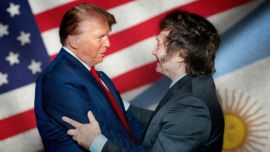If the Argentine state has long been accused of seeking to nationalise the profits and privatise the losses (even if the foreign debt is often presented by its critics as a mechanism for doing the exact opposite), last week produced a signed confession in the form of the proposed windfall taxation on “unexpected income.” As everybody knows, there is no such thing as “expected income” when it comes to business profits, which are inherently volatile – you win some, lose some. In proposing to milk any commodity price bonanza arising from the Ukraine war without offering anything to recoup losses (aside from the accompanying bonus for low-income groups and subsidies for household gas and electricity bills, which are now apparently starting to become volatile too), the government is blatantly applying a “heads I win, tails you lose” logic.
The mere suggestion has produced an outburst of largely predictable spluttering from the opposition and business chambers, most of which is entirely justified but also quite likely overblown. The last thing Argentina needs is a 166th tax, they argue, overloading formal sectors in particular and thus favouring the growth of the underground economy – a tax burden which has nearly doubled in almost two decades of Kirchnerism and is way above the regional average. Diverting profits to state coffers conspires against investment and hence job creation, it is further argued (not that investment seems to pick up much whenever the state does ease the pressure, perhaps because a populist comeback sooner or later is feared, not without reason).
Yet not only might commentary be premature ahead of any definition of this nebulous levy when more specific criticisms can be added to the general objections – the opposition and business critiques could be slightly off-target in misreading a political stunt as an economic policy. To assume that Martín Guzmán thinks along entirely economic lines as a highly trained economist with the title of Economy Minister would be completely logical but this might be the exception which proves the rule.
What we were told by President Alberto Fernández and Guzmán in Monday’s press conference was that the government was springing to the rescue of the poor (in the form of a bonus of 18,000 pesos over two months to the informally employed, the lowest categories of self-employed and those in domestic service, as well as a single payment of 12,000 pesos for the retired with less than twice the minimum pension, a package totalling 200 billion pesos and reaching 13 million people) by soaking the rich with the upcoming windfall taxation.
But in point of fact the government already had the money for this bonus thanks to the more brutally effective tax of inflation. The primary fiscal deficit of 0.25 percent of gross domestic product posted for the first quarter of this year comfortably undershot the level permitted by the International Monetary Fund (IMF) thanks to the cushion provided by collecting taxes in real time while paying out wages, pensions, etc. at the end of months or quarters (thus state revenues rose by almost 59 percent last year as against a 2021 inflation of 50.9 percent) – the worse the inflation, the better for the government in these terms. Look who’s talking with “unexpected income.”
Within that context, what would have been the politically smarter way of presenting the bonus last Monday? To tell the truth: “Thanks to the inflation which has been making life impossible for the poor in particular, we have been raking in extra money and can actually afford this temporary handout to millions of people to keep them barely above the poverty line for now without infringing the IMF parameters”? Or what they actually said along the Robin Hood lines of saving the poor by squeezing the rich (outside the public sector, of course)? For Guzmán at least this line had the added benefit of winning brownie points among the supporters of Vice-President Cristina Fernández de Kirchner in the Frente de Todos infighting by thus grandstanding against dollar millionaires and peso billionaires.
Those who do not see any political smokescreen behind this move but merely another blind onslaught against the private sector should still await both a clearer picture and the final outcome of this windfall tax proposal. The main windfalls from the Ukraine war have obviously been accruing to the farming sector but the government did not want to spell this out in order to avoid more aggro with agro – instead Guzmán specified a flat rate of a billion pesos in profits, which makes the levy look far more like a revival of last year’s wealth tax in disguise. At the top end of enterprises, a billion pesos might well be a normal margin rather than any windfall while some companies could see their profits soar several hundred percent without coming anywhere near 10 digits. In any case, when and if this levy does take final shape, it is unlikely to advance much further in a Congress which is both hostile and dysfunctional.
Not much space left in a column which has yet to live up to its slug by relating the present to the past – one prime reason for this is that no previous instance of windfall taxation jogs the memory among all this country’s multiple levies. But in the wider world I do have memories of windfall taxation stretching back almost half a century to the aftermath of the OPEC oil crisis of 1973-1974 – the Crude Oil Windfall Profit Tax Act of 1980 at the tail end of the Jimmy Carter administration in the United States while Britain’s Tony Blair hit the ground running with his windfall taxation (called by that name) on recently privatised public companies in his first year in power in 1997.
Windfall taxation has thus been common currency for some time in the developed world, under centre-left governments at least, while right now the IMF Spring Meeting in Washington is explicitly suggesting higher corporate taxation to capture “excess profits” to counter the ravages of the pandemic and war. It would thus be erroneous for any Argentine exceptionalism to place it in the same bag as export duties as a new outrage virtually unique to this country. Which does not make yet another tax a good thing.



















Comments